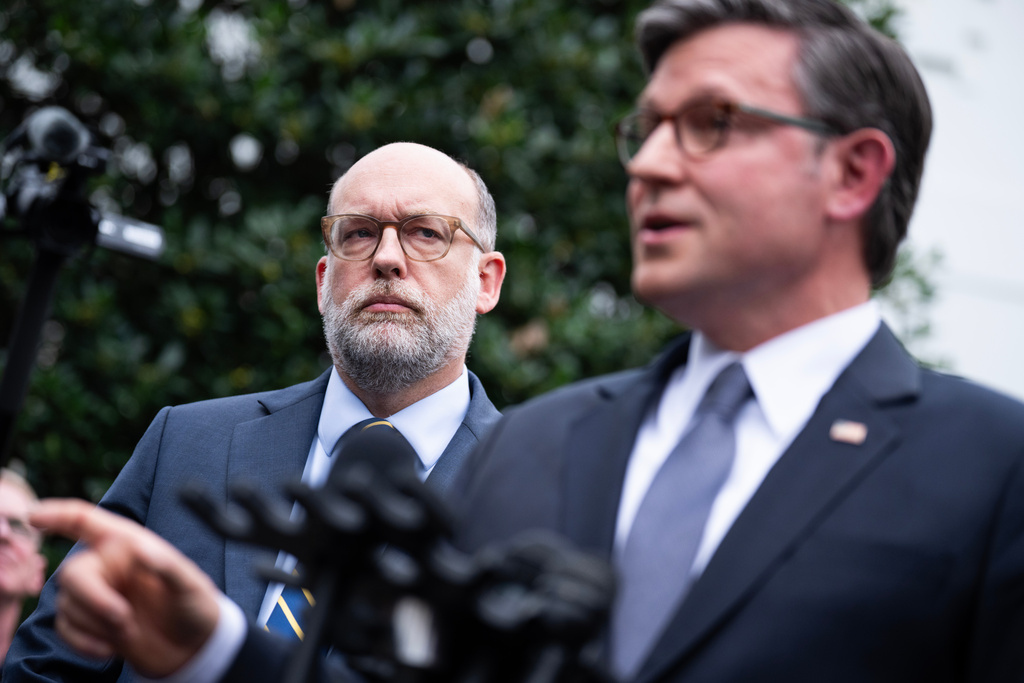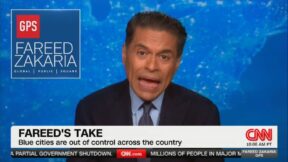The Shutdown Isn’t a Stalemate — It’s a Power Grab. And the Media Are Missing It.

(Tom Williams/CQ Roll Call via AP Images)
The current government shutdown has inspired a familiar Washington ritual: reporters sprinting toward the nearest bank of microphones to tally up partisan talking points like it’s election night. Democrats blame Republicans. Republicans blame Democrats. Pundits handicap who’s “winning the blame game” as if this were some high-stakes Super Bowl of spin.
But amid all the breathless horse-race coverage, the press is largely missing the real story: this shutdown isn’t just a byproduct of gridlock. It’s a strategy — a calculated power grab by a faction of the Republican Party that has long dreamed of dismantling traditional legislative norms and centralizing authority in the executive branch.
At the center of this maneuver is Russ Vought, President Donald Trump’s budget director and the ideological architect behind the controversial Project 2025 blueprint. Vought has spent years sketching out how a future Republican administration could radically reshape the federal government, concentrating power in the hands of loyalists while sidelining institutional checks and balances.
Now, thanks to the shutdown, he’s getting a dry run.
With Congress effectively paralyzed, Vought has been making sweeping, unilateral spending decisions that target Democratic-leaning states and programs — the kind of moves that would normally be subject to negotiation and oversight. It’s the bureaucratic equivalent of wielding a line-item veto as a sledgehammer.
Speaker Mike Johnson, for his part, offered an almost comically straight-faced defense of Vought’s role at a Thursday press conference:
Russ does this reluctantly. He takes no pleasure in this. Because Russ has to sit down and decide which policies, personnel, and which programs are essential and which are not. That’s not a fun task and he’s not enjoying that responsibility … if they keep the government closed, it’s gonna get more and more painful.
Johnson seemed to be describing the agony of a reluctant dentist forced to drill without anesthesia. In reality, the power to pick winners and losers is precisely what this faction has been angling for. As Sen. Mike Lee put it rather nakedly on Fox News, “This is what they’re doing, doing it deliberately. It’s going to harm them. Russ Vought has been dreaming about this moment since puberty.”
This is not a bug of the shutdown — it’s the feature.
A frozen Congress effectively hands the keys to the Executive Branch, allowing unelected operatives to act with sweeping discretion. That’s why, despite the public theater of partisan outrage, Republicans appear privately pleased with the stalemate. It gives them what they’ve wanted for years: a chance to govern unilaterally, free of bicameral compromise or pesky bipartisan negotiation.
And here’s where the media have face-planted. Coverage has largely stuck to the well-worn grooves of “both sides blame each other” reporting. We’ve gotten the usual polling questions (“Who do voters blame more?”) and the predictable think-pieces about which party will suffer in swing districts. What’s been glaringly absent is a serious accounting of how this shutdown is being used — not endured — by a specific ideological project to reshape governance itself.
Trump, for his part, has tried to distance himself from Project 2025 during the campaign, but on Thursday, he posted praise for Vought on Truth Social, removing any lingering ambiguity. This is a coordinated maneuver, not an accident.
The irony, of course, is that many reporters covering this saga already know all of this. The players are familiar, their ambitions transparent. Yet the gravitational pull of blame-game narratives remains irresistible. It’s easier to cover the fight than the plan behind the fight. But in doing so, the press risks missing one of the most significant stories of the moment: the slow-motion hijacking of the federal apparatus by a faction that understands power far better than its opponents — and, apparently, the press.
This is an opinion piece. The views expressed in this article are those of just the author.
New: The Mediaite One-Sheet "Newsletter of Newsletters"
Your daily summary and analysis of what the many, many media newsletters are saying and reporting. Subscribe now!






Comments
↓ Scroll down for comments ↓